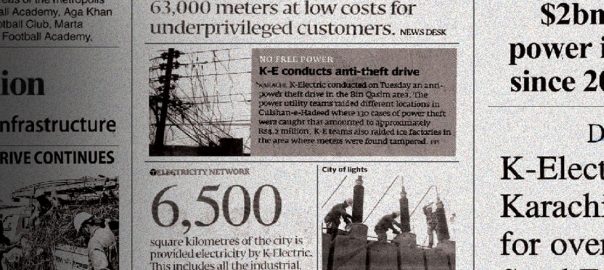71% of network remains exempt from loadshed
JULY 13, 2023, KARACHI: Following a periodic assessment of the network, 71% of the city remain exempt from load shed under the schedule published by K-Electric, effective immediately. The schedule, which is publicly available on the company’s website and KE Live app, is based on a review of KE’s network of 2,000 feeders for electricity theft and non-payment of bills, which form the basis for loadshed. The last review was conducted in March 2023.
Spokesperson KE clarified that “71% of KE’s network continues to receive uninterrupted power supply. These are areas where bills are paid on time and electricity theft is low. The remaining areas include regions where up to 90% of electricity is stolen and bills against actual consumption are unpaid. Areas with this profile account for about 25% of the network and receive 14 hours of electricity supply every day.”
The spokesperson reiterated that supply improves in areas where bills are paid regularly and theft decreases. Examples of such improvement can be seen in areas like Behar Colony and Tannery Road in Lyari associated with “Offbeat Street” with reported AT&C losses of 27.9% in comparison to March this year. “Roshanabad” feeder providing electricity to Shah Faisal Colony no. 5, located near the Airport has also recorded losses of 30.7% which is resulting in a decrease of 4 hours in the duration of loadshed. Similarly, areas like Gulshan-e-Areesha, Jehangir Town, Johar Complex served by “Areesha CHS” feeder have recorded losses of 22.3%; “New Iqbalabad” feeder in Shah Faisal serving Drigh Road Cantt, Al-Haider, and Tandoor Colony, has also reported AT&C losses of 21.1% which is resulting in a reduction of loadshed duration by up to 6 hours.
KE has installed smart meters on its infrastructure which enables the company to rigorously monitor the number of electricity units dispatched, billed, and lost in any part of the network. This tracking and data-based approach leads to actionable insights and maintains transparency in the periodic assessment.
Conversely, loadshed duration has increased in areas where electricity theft has risen or the propensity to pay has been negatively impacted owing to macroeconomic conditions and government-mandated increases in price of electricity. Examples of this has been seen in areas associated with feeders named “Punjab Town” in Malir serving Moria Khan Goth, Falak Naz Towers, and Falak Naz Height, which has recorded an AT&C loss of 28% in comparison to March the same year. Similarly, “Soomra CHS” feeder Johar associated with Soomra Society has recorded 48.6% losses, while “Bilalabad” feeder in Landhi powering areas like Sector 4D, 5D, and 5C stood at 36.2% losses. Areas in Orangi such as Sector 11-A, 11-E, 12-L and Urdu Chowk among others served by “Zia-ul-Haq Colony” feeder in Orangi have reported a loss of 36.6%. Spokesperson clarified that these areas will be monitored closely until the next review and appealed to elected area representatives to work with the company in addressing the challenge of theft and non-payment of bills. In the prevailing macroeconomic conditions, “free electricity” cannot be provided to such areas where bill payment is low or continues to decline.
KE regularly establishes facilitation camps in coordination with area representatives to inculcate a culture of regular bill payment. Distribution field teams are also conducting kunda removal activities around the clock to reduce theft.
All stakeholders from the customer to the Federal Government have a role to play to help adapt and adjust by adopting energy conservation measures amid a tough economic climate and ensure the long-term sustainability of the power sector. The first step is to end theft and ensure payment of bills.

ABOUT K-ELECTRIC:
K-Electric (KE) is a public listed company incorporated in Pakistan in 1913 as KESC. Privatized in 2005 KE is the only vertically integrated utility in Pakistan supplying electricity within a 6500 square kilometers territory including Karachi and its adjoining areas. The majority shares (66.4%) of the company are listed in the PSX owned by KES Power, a consortium of investors including Aljomaih Power Limited of Saudi Arabia, National Industries Group (Holding), Kuwait, and the Infrastructure and Growth Capital Fund (IGCF). The Government of Pakistan is also a minority shareholder (24.36%) in the company.


